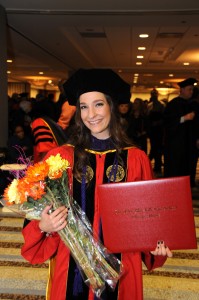 (Valedictory address delivered by Carlin V. Comerouski at the Jan. 19, 2014 commencement.)
(Valedictory address delivered by Carlin V. Comerouski at the Jan. 19, 2014 commencement.)
On behalf of my fellow graduates, I’d like to sincerely thank all of our friends and family, not only for being here to share this exciting occasion with us, but also for your support and encouragement along the way.
As an undergrad history major, I think it’s safe to say that I ended up in law school for two main reasons: the first is that there is not much else you can do with a history major, and the second reason is my deep appreciation for our country’s rich history, unique system of government, and ultimately, the Constitution. In fact, I recently saw a social media post of mine from last year that stated: “The genuine love that I have for constitutional history is disconcerting.” While I’m not quite sure what spurred that very nerdy proclamation, I think you get the point.
Something in particular that I’ve always found to be interesting about the history of the Constitution was the group of men that came together and created it. The Founding Fathers originated from a variety of backgrounds, and they offered diverse talents. Some of them were businessmen and some were farmers, but a great majority of the men who crafted the Constitution were lawyers. Specifically, 35 of the 55 delegates to the Constitutional Convention had benefitted from legal training.
Furthermore, lawyers have always been prominent players in our country’s history and in the implementation of its Constitutional principles. Of our 44 presidents thus far who have all taken an oath to “preserve, protect and defend” the Constitution, 25 of them were (or are) lawyers. Likewise, throughout history, the United States Supreme Court has been composed of lawyers ultimately responsible for interpreting the Supreme Law of the Land.
And we, now as law school graduates, also have the responsibility to continue this rich tradition of respecting and upholding the Constitution as attorneys. Like the Founding Fathers, we bring a variety of backgrounds and diverse talents to the table. Whether we actually become Constitutional lawyers, or corporate lawyers, or litigators, or politicians, or maybe don’t even practice law at all, we now have the opportunity and privilege to be a part of this strong record of lawyers and their interplay with this great governing document.
The Constitution is ultimately fundamental to our system of government. Crafted by “we the people of the United States,” it provides the necessary freedoms which allow for our society to prosper. George Washington once said, “The Constitution is the guide which I never will abandon.” Let’s join him in that resolution.


